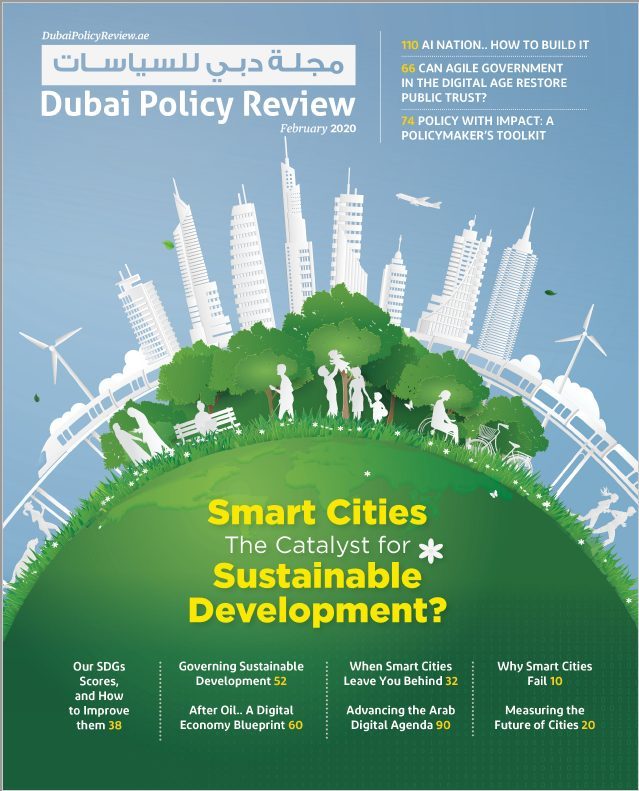
Smart Cities The Catalyst for Sustainable Development?
Feb 2020
As you read through the thought-provoking contributions in the 2nd edition of the Dubai Policy Review, the link between sustainable development on the one hand, and smart cities and digital development on the other, becomes clear. When smart cities fail, they create expensive lost opportunities for development, and may lead to urban and social decay (Pardo). However, assessing if they are succeeding and measuring their performance towards the future is highly complex and can lead to different pathways (Lanvin). Moreover, cities will soon host the majority of the world’s population. If we are to really "leave no one behind", then having cities that grow ‘smart’, but become less accessible, will be a step backwards for many of the sustainable development goals (Pineda and Poitier). Meanwhile, in the Arab region, we now know which of the SDGs we are lagging behind on, what local data to gather, how to prioritize and the urgency of regional coordination (Luomi). We have global lessons on the novel governance structures and innovative policy approaches we can establish (Fyson, Lindberg and Morales, OECD). Moving ahead towards a sustainable future will also require painful economic transformations and trade-offs (Arezki, World Bank). These command adopting agile governance approaches and taking painful steps to respond to the pressing social changes of the digital age (Santiso, CAF Development Bank). They require comprehensive policy instruments that inform, measure and drive impact and value in complex policymaking ecosystems (Andrews and Samji). However, given the monumental challenges the region faces, governments cannot lead this transformation alone. They need to empower societal leaders and collaborate with change-makers willing to drive large-scale developmental interventions (Jalbout). At a strategic level, governments in the region need to apply a holistic agenda for development that embraces digital transformation at the core (El-Sherbiny, UN ESCWA). A key part of which will rely on building a future-facing digital economy that adapts to the knowledge economy era (Al-Khouri). However, to achieve these ambitious developmental goals, nations have to find their own formulas for adopting novel transformations, such as data-driven and AI-enabled digital government (AlDhaheri).
-
Building an AI Nation: Accelerating Artificial Intelligence Adoption through Agile Policymaking - The Case of the UAE
-
Building the Arab Digital Economy - A Strategy Blueprint
-
Developing the Digital Future of the Arab World: A Policy Roadmap towards National Agendas
-
How to Implement Policies with Impact? A Policymakers’ Toolkit
-
Governance for the SDGs - How Can We Accelerate Achieving the Sustainable Development Goals?
-
Turning the Tide in the Arab Region: How Data-driven Policy Can Accelerate Achieving the SDGs
-
The Future of Cities - What Can Policymakers Learn From Smart Cities Measurements?

